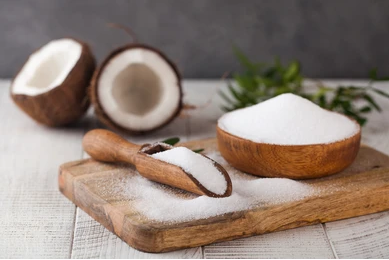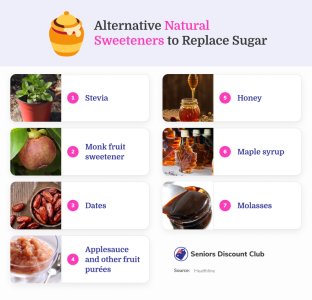Assessing the safety of erythritol: Are concerns justified or unfounded? Here’s what experts say
By
- Replies 0
As we age, our bodies undergo various changes, and one of the most common concerns that many older adults face is the risk of developing diabetes.
Diabetes is a chronic condition that affects millions of people worldwide and is characterised by high blood sugar levels. For seniors, the risk of developing diabetes can increase due to various factors, such as age-related insulin resistance and decreased physical activity.
As a result, many elderly individuals have become more conscious of their sugar intake and are seeking alternatives. Traditional sugar has been linked to numerous health concerns, including weight gain, dental problems, and an increased risk of developing diabetes.
Therefore, many health-conscious people opt for healthier alternatives, such as natural sweeteners like stevia, honey, and dates.
Additionally, sugar alcohols such as erythritol are also gaining popularity as an alternative to traditional sugar, as they are low in calories, have a lower glycemic index, and do not contribute to tooth decay.
However, recent studies have linked excessive consumption of erythritol to an increased risk of cardiovascular diseases, indicating that moderation is still key when it comes to sugar alternatives.

So, should we now ditch erythritol? Well, not yet! According to some researchers, it may be premature to completely abandon their use as a sugar alternative.
According to Professor Nita Forouhi from the MRC Epidemiology Unit at the University of Cambridge, while recent research has suggested a potential link between the sugar alcohol erythritol and an increased risk of cardiovascular disease, the methodology of the study can be questioned.
She pointed out that the findings from the studies are limited to patients undergoing cardiac risk assessment and may not be applicable to the general population.
Dr Forouhi said: ‘A number of important factors were not accounted for that may significantly impact the observed associations. These include participants’ ethnicity, socio-economic status, alcohol consumption and their diet as each of these may be related both to erythritol consumption and cardiovascular disease risk.’
While an interventional study showed an elevation of erythritol levels after ingestion, it is unclear how much of the blood levels of erythritol are from dietary consumption versus metabolic processes within the body.
She continued: ‘The evidence is not yet definitive but highlights the importance of further research. Future research such as with long-term observational studies and appropriately designed clinical trials is still needed to establish the evidence and to determine safe levels in an environment of increasing use of artificial sweeteners.’
Gunter Kuhnle, a Professor of Nutrition and Food Science at the University of Reading, commented on the ongoing discussion about the safety of sweeteners, particularly in soft drinks, in relation to the study's findings on erythritol's potential adverse effects.
He pointed out that while the study investigated the physiological effects of erythritol, the amount of sweetener used was ten times higher than the permitted amount in drinks in the UK and Europe, making the interpretation difficult.
Kuhnle also mentioned that observational studies could provide more reliable data on the links between sweetener intake and health as they reflect a regular diet.
He explained: ‘Unfortunately, the authors do not provide any information about the erythritol concentration found in the study populations, and this makes an interpretation difficult.’
Kuhnle suggested that the origin of plasma erythritol and the participants' age may also explain the results.
He said: ‘The press release is very cautious in making a bold claim, and I agree that the information is interesting and useful, but definitely not suitable to cause anyone to worry.’
Additionally, according to Oliver Jones, Professor of Chemistry at RMIT University, the study on the potential association between erythritol and health impacts is thought-provoking and based on sound science.
The high number of study participants and well-analysed data add to the validity of the findings. The study suggests that higher erythritol levels may increase the risk of blood clots forming, which could, in turn, increase the risk of disease.
However, correlation does not prove causation, and further research is needed to establish a definitive link between erythritol and clotting risk.
Additionally, since the study only looked at erythritol, which is generally considered safe, any potential risks must be balanced against the known health risks of excessive glucose consumption.
Therefore, while the study warrants further investigation, it is not a cause for alarm, and sweeteners should not be thrown out just yet.
Tom Sanders, a Professor of Nutrition and Dietetics at King's College London, talked about a study that measured certain substances in the blood of people tested for heart problems in the US.
The study found that people with high levels of sugar alcohol in their blood were twice as likely to die or have heart problems. This was especially true for erythritol, a sweetener often used instead of sugar in products for people with type 2 diabetes. The study was repeated in the US and Denmark and got similar results.
Sanders said that even after taking into account known factors that increase the risk of heart disease, people with poor kidney function were still more likely to have problems with their heart if they had high levels of sugar alcohols in their blood.
But Sanders also said that there were some limitations to the study. For example, the study didn't look at how platelets (cells that help the blood to clot) reacted after people had eaten erythritol. Instead, the researchers made predictions based on their lab tests. Sanders said that it would be more convincing if they had tested platelets from people who had eaten erythritol.
Sanders also pointed out that erythritol is often used as an artificial sweetener, and it's likely that the high levels found in people's blood came from this. While the levels in food are usually low, some artificial sweeteners can contain up to 30 grams of erythritol a day. Unlike most other sugar alcohols, erythritol isn't broken down in the gut but is passed out of the body unchanged in the urine.
Long-term toxicological studies on erythritol in animals found nothing remarkable, but the mechanism by which erythritol might affect platelet function is unclear, especially as it is a relatively unreactive molecule.
Finally, according to Dr Duane Mellor, a Senior Lecturer and Registered Dietitian at Aston Medical School, this study on the sweetener erythritol's association with cardiovascular disease risk is interesting.
The study examined population data and found that individuals with high plasma levels of erythritol were more likely to experience a major adverse cardiovascular event (MACE).
However, Dr Mellor emphasises that this does not necessarily indicate a significant risk for heart disease or stroke when considering erythritol's association with dietary intake.
He notes that erythritol can be produced by our bodies through a biochemical pathway and that the observed risk could be attributed to an individual's overall lifestyle and other risk factors.
Additionally, the study's experiment involved giving participants 30g of erythritol in a drink, which Dr Mellor suggests is a higher intake than what is typical for most individuals in the UK. He also highlights that erythritol occurs naturally in certain foods and recommends not exceeding a total of 25g of sugar alcohols per day, as they can have laxative effects.
Dr Mellor notes that the study's reported effects on blood stickiness and clotting were based on blood and plasma samples, not directly on the participants' bodies after consuming the sweetened drink.
Therefore, he believes that the study does not provide conclusive evidence of erythritol's association with cardiovascular disease as a sweetener.
Nevertheless, he emphasises the importance of reducing sugar intake and using sweeteners in moderation to ultimately decrease the consumption of sweetened foods and drinks in our diet.

So, there you have it, folks! It’s still best to consult your GP before making any dietary changes as they can give you a better assessment of your health.
The takeaway here is that you should still take the findings of this study with a grain of salt and remember to always practice moderation when consuming meals and drinks.
There are also sugars derived from natural sources that you might want to consult with your GP about whether they are a good option for you:
What are your thoughts on this, members? Share them with us in the comments below!
Diabetes is a chronic condition that affects millions of people worldwide and is characterised by high blood sugar levels. For seniors, the risk of developing diabetes can increase due to various factors, such as age-related insulin resistance and decreased physical activity.
As a result, many elderly individuals have become more conscious of their sugar intake and are seeking alternatives. Traditional sugar has been linked to numerous health concerns, including weight gain, dental problems, and an increased risk of developing diabetes.
Therefore, many health-conscious people opt for healthier alternatives, such as natural sweeteners like stevia, honey, and dates.
Additionally, sugar alcohols such as erythritol are also gaining popularity as an alternative to traditional sugar, as they are low in calories, have a lower glycemic index, and do not contribute to tooth decay.
However, recent studies have linked excessive consumption of erythritol to an increased risk of cardiovascular diseases, indicating that moderation is still key when it comes to sugar alternatives.

Scientists are currently discussing whether or not there is a connection between consuming erythritol and cardiovascular diseases. Credit: Shutterstock.
So, should we now ditch erythritol? Well, not yet! According to some researchers, it may be premature to completely abandon their use as a sugar alternative.
According to Professor Nita Forouhi from the MRC Epidemiology Unit at the University of Cambridge, while recent research has suggested a potential link between the sugar alcohol erythritol and an increased risk of cardiovascular disease, the methodology of the study can be questioned.
She pointed out that the findings from the studies are limited to patients undergoing cardiac risk assessment and may not be applicable to the general population.
Dr Forouhi said: ‘A number of important factors were not accounted for that may significantly impact the observed associations. These include participants’ ethnicity, socio-economic status, alcohol consumption and their diet as each of these may be related both to erythritol consumption and cardiovascular disease risk.’
While an interventional study showed an elevation of erythritol levels after ingestion, it is unclear how much of the blood levels of erythritol are from dietary consumption versus metabolic processes within the body.
She continued: ‘The evidence is not yet definitive but highlights the importance of further research. Future research such as with long-term observational studies and appropriately designed clinical trials is still needed to establish the evidence and to determine safe levels in an environment of increasing use of artificial sweeteners.’
Gunter Kuhnle, a Professor of Nutrition and Food Science at the University of Reading, commented on the ongoing discussion about the safety of sweeteners, particularly in soft drinks, in relation to the study's findings on erythritol's potential adverse effects.
He pointed out that while the study investigated the physiological effects of erythritol, the amount of sweetener used was ten times higher than the permitted amount in drinks in the UK and Europe, making the interpretation difficult.
Kuhnle also mentioned that observational studies could provide more reliable data on the links between sweetener intake and health as they reflect a regular diet.
He explained: ‘Unfortunately, the authors do not provide any information about the erythritol concentration found in the study populations, and this makes an interpretation difficult.’
Kuhnle suggested that the origin of plasma erythritol and the participants' age may also explain the results.
He said: ‘The press release is very cautious in making a bold claim, and I agree that the information is interesting and useful, but definitely not suitable to cause anyone to worry.’
Additionally, according to Oliver Jones, Professor of Chemistry at RMIT University, the study on the potential association between erythritol and health impacts is thought-provoking and based on sound science.
The high number of study participants and well-analysed data add to the validity of the findings. The study suggests that higher erythritol levels may increase the risk of blood clots forming, which could, in turn, increase the risk of disease.
However, correlation does not prove causation, and further research is needed to establish a definitive link between erythritol and clotting risk.
Additionally, since the study only looked at erythritol, which is generally considered safe, any potential risks must be balanced against the known health risks of excessive glucose consumption.
Therefore, while the study warrants further investigation, it is not a cause for alarm, and sweeteners should not be thrown out just yet.
Tom Sanders, a Professor of Nutrition and Dietetics at King's College London, talked about a study that measured certain substances in the blood of people tested for heart problems in the US.
The study found that people with high levels of sugar alcohol in their blood were twice as likely to die or have heart problems. This was especially true for erythritol, a sweetener often used instead of sugar in products for people with type 2 diabetes. The study was repeated in the US and Denmark and got similar results.
Sanders said that even after taking into account known factors that increase the risk of heart disease, people with poor kidney function were still more likely to have problems with their heart if they had high levels of sugar alcohols in their blood.
But Sanders also said that there were some limitations to the study. For example, the study didn't look at how platelets (cells that help the blood to clot) reacted after people had eaten erythritol. Instead, the researchers made predictions based on their lab tests. Sanders said that it would be more convincing if they had tested platelets from people who had eaten erythritol.
Sanders also pointed out that erythritol is often used as an artificial sweetener, and it's likely that the high levels found in people's blood came from this. While the levels in food are usually low, some artificial sweeteners can contain up to 30 grams of erythritol a day. Unlike most other sugar alcohols, erythritol isn't broken down in the gut but is passed out of the body unchanged in the urine.
Long-term toxicological studies on erythritol in animals found nothing remarkable, but the mechanism by which erythritol might affect platelet function is unclear, especially as it is a relatively unreactive molecule.
Finally, according to Dr Duane Mellor, a Senior Lecturer and Registered Dietitian at Aston Medical School, this study on the sweetener erythritol's association with cardiovascular disease risk is interesting.
The study examined population data and found that individuals with high plasma levels of erythritol were more likely to experience a major adverse cardiovascular event (MACE).
However, Dr Mellor emphasises that this does not necessarily indicate a significant risk for heart disease or stroke when considering erythritol's association with dietary intake.
He notes that erythritol can be produced by our bodies through a biochemical pathway and that the observed risk could be attributed to an individual's overall lifestyle and other risk factors.
Additionally, the study's experiment involved giving participants 30g of erythritol in a drink, which Dr Mellor suggests is a higher intake than what is typical for most individuals in the UK. He also highlights that erythritol occurs naturally in certain foods and recommends not exceeding a total of 25g of sugar alcohols per day, as they can have laxative effects.
Dr Mellor notes that the study's reported effects on blood stickiness and clotting were based on blood and plasma samples, not directly on the participants' bodies after consuming the sweetened drink.
Therefore, he believes that the study does not provide conclusive evidence of erythritol's association with cardiovascular disease as a sweetener.
Nevertheless, he emphasises the importance of reducing sugar intake and using sweeteners in moderation to ultimately decrease the consumption of sweetened foods and drinks in our diet.
Key Takeaways
- Sugar alcohols like erythritol have become popular alternatives to traditional sugar due to their lower calorie count and reduced impact on tooth decay.
- Recent studies have suggested a potential link between erythritol consumption and an increased risk of cardiovascular disease, but some experts believe further research is needed to determine the true relationship between the two.
- Observational studies could provide more reliable data on the links between sweetener intake and health, as they reflect a normal diet.
- While the study warrants further investigation, it is not yet a cause for alarm, and sweeteners should not be completely discarded as viable sugar alternatives. Instead, it is important to reduce sugar intake and use sweeteners in moderation.
So, there you have it, folks! It’s still best to consult your GP before making any dietary changes as they can give you a better assessment of your health.
The takeaway here is that you should still take the findings of this study with a grain of salt and remember to always practice moderation when consuming meals and drinks.
There are also sugars derived from natural sources that you might want to consult with your GP about whether they are a good option for you:
What are your thoughts on this, members? Share them with us in the comments below!








